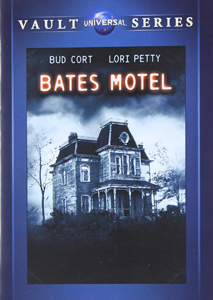The 1987 TV pilot (sometimes called “TV movie”) “Bates Motel” (NBC) is by far the worst installment of the “Psycho” franchise – rating even lower than the famously loathed 1998 “Psycho” on IMDb – but also one of the most fascinating to discuss.
It’s hard to imagine who the target audience is. When the sequels came out in the Eighties, many Hitchcock fans found their existence blasphemous. Still, the films found an audience. But then this TV pilot – since released on DVD — ignores the events of the sequels (even though they were ongoing at this time, between parts three and four). So “Bates Motel” irked almost all potential fans upon its release.
In the story by Richard Rothstein, who also directs, Norman (played by Kurt Paul in shots where you can hardly see his face) never got out of the mental hospital, and has indeed died there. He had befriended fellow patient Alex West (Bud Cort), to whom he bequeaths the hotel and house.

“Bates Motel” (1987)
TV pilot, NBC
Director: Richard Rothstein
Writer: Richard Rothstein
Stars: Bud Cort, Lori Petty, Moses Gunn
Location, location, location
“Bates Motel” – unlike the ridiculous “Omen” TV pilot from 1995 – deserves credit for being immersed in its saga, at least when it chooses to be, rather than just using the IP to get attention. The story opens with a thorough portrayal of how Fairvale has grown to the point that the Bates property now has value again. A lot of sequels alter established points on a whim, but this show earns the alteration.
I almost want to call Alex “Norman,” because he’s like a Norman Redux. Alex had killed his awful stepfather, thus earning that asylum stay. Cort is an unusual looking actor, but there’s no sense of menace lurking under the surface. “Bates Motel” openly wants us to love both Norman and Alex, without ambiguity.
The 90-minute pilot uses a score that calls to mind melodramatic Eighties primetime TV – about as far from Bernard Herrmann as you can get – and when it introduces the subplot-of-the-week (thus establishing the structure), I got “Afterschool Special” vibes.
A group of raucous high schoolers (including Jason Bateman and Khrystyne Haje) engaged in a Fifties-themed party checks into the motel, overlapping with the suicidal first guest, middle-aged Barbara (Kerrie Keane). The twist calls to mind ghost flashback episodes of “My So-Called Life” and “Buffy” from the next decade. Were this a modern episode, a suicide prevention hotline announcement would’ve run at the end.

If one is extremely generous, the blend of horror and the supernatural with a tinkly primetime soap score presages the borderline comedic quality of “Twin Peaks,” which debuted in 1990. It also seems for a while like “Bates Motel” might be an early mythology/standalone blend – something that went mainstream with “Twin Peaks” and “The X-Files” – but that’s a fake-out.
Not to be Petty …
The A-plot about the grounds being haunted by Mrs. Bates does give way to the sock-hopper B-plot for a good chunk of the runtime, but then it doubles back and resolves. The “Scooby Doo” ending reveals the villain – as was obvious — is banker Tom (Gregg Henry, seemingly middle-aged his whole career), who is taking advantage of Alex’s naivete about lending.
I’ve already mentioned a few well-known actors in the cast, but the standout is Lori Petty – later known for “Point Break,” “A League of Their Own” and “Tank Girl” – as a sort of Manic Pixie Dream Girl who had been squatting in the Bates house.
Although Willie makes noise about having a wealth of options for what to do with her life, she clearly wants to stick around and help Alex reopen the motel. With no help from the script, Petty creates a cute and likable (if unlikely) character. (Although it would make sense if Willie was a figment of Alex’s imagination, she’s not, as other people interact with her.)
As noted, “Bates Motel” doesn’t care about the established mythology of the movies (even though it seems to be shot on the same backlot; the motel and house look like they’re supposed to), but it goes even further. For some bizarre reason, Norman’s mother is called Gloria and his father is called Jake. At this point, the mom had been established as Norma and the dad as John. (The dad would become Sam in the 2013 TV series.)
I can’t recommend “Bates Motel” 1987 to casual followers of the “Psycho” franchise or Hitchcock’s oeuvre – unless you want to see an outright anti-Hitchcock style of filmmaking, wherein odd stuff lands like odd stuff rather than suspense-building moments. Strangely, though, I do recommend it to folks who want to soak up the entire “Psycho” saga: It’s bad in a bizarre enough way to be fascinating.
RFMC’s Alfred Hitchcock series reviews works by the Master of Suspense, plus remakes and source material. Click here to visit our Hitchcock Zone.

